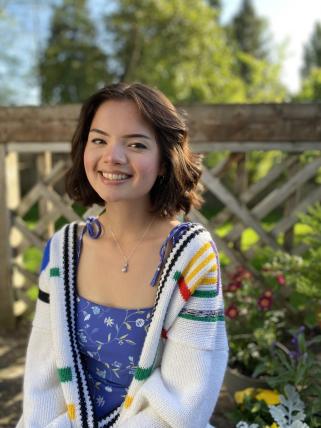The American Historical Association’s (AHA) annual conference is considered the premier conference for historians working within the American university system. It’s the kind of gathering where one expects to find many of the greatest historians of the era: tenured faculty, renowned academics, leading experts, and occasionally a lucky and precocious graduate student. Yet, amid all these academic “big shots” was UW senior Melinda Whalen, who traveled to this year's AHA conference in Philadelphia, PA to present her research on Russian diaries recovered after the siege of Leningrad during WWII. This presentation was the culmination of Melinda’s indipendent research project, which focused on how the siege impact perceptions of gender and age, focusing specifically on adolescents—and was part of a much larger intellectual journey for Melinda that transformed her into a budding historian.
Going to the University of Washington was never much of a question for Melinda—she grew up in Seattle, her dad worked at the University, and both her brother went here. “It’s a family affair!” she said about her decision to attend. Finding her major in history, however, was a little more complicated. Her family members are mostly in STEM fields, and she initially considered a major in graphic design. She sheepishly admits that she took her first history class, “Cold War Truths and Legacies,” as a “credit filler.” After a few weeks in Dr. Kyle Haddad Fonda's class, though, she realized there was a lot more to history that she had never learned in highschool, and she found herself looking forward to her history classes more than those within her intended major of graphic design. What interested her most about college-level history was its focus on primary sources such as diaries, letters, personal documents, and even plays and other forms of entertainment rather than just reading from a textbook. By winter quarter of her freshman year, she knew she wanted to switch her major to history.
Melinda’s time in the department has been overwhelmingly positive. “[The] professors are all super nice and go out of their way to help me! … I’ve never had a negative experience in the history department.”
Fortunately, Melinda’s work as a historian doesn’t end with her AHA presentation or even graduation this spring. She was awarded the prestigious Beinecke Scholarship, a substantial award to support the graduate education of scholars of exceptional promise, which requires her to go to grad school. She plans to begin her PhD program on Soviet history fall of 2024 and hopes to one day be a professor herself.
When she’s not in the classroom or researching, Melinda enjoys being a part of the Husky Tennis Club—though, even there, she often ends up talking about history. “[All of the other club members] have no idea what history majors do, people have so many questions for me,” adding with glee, “I feel like a rare specimen!”
